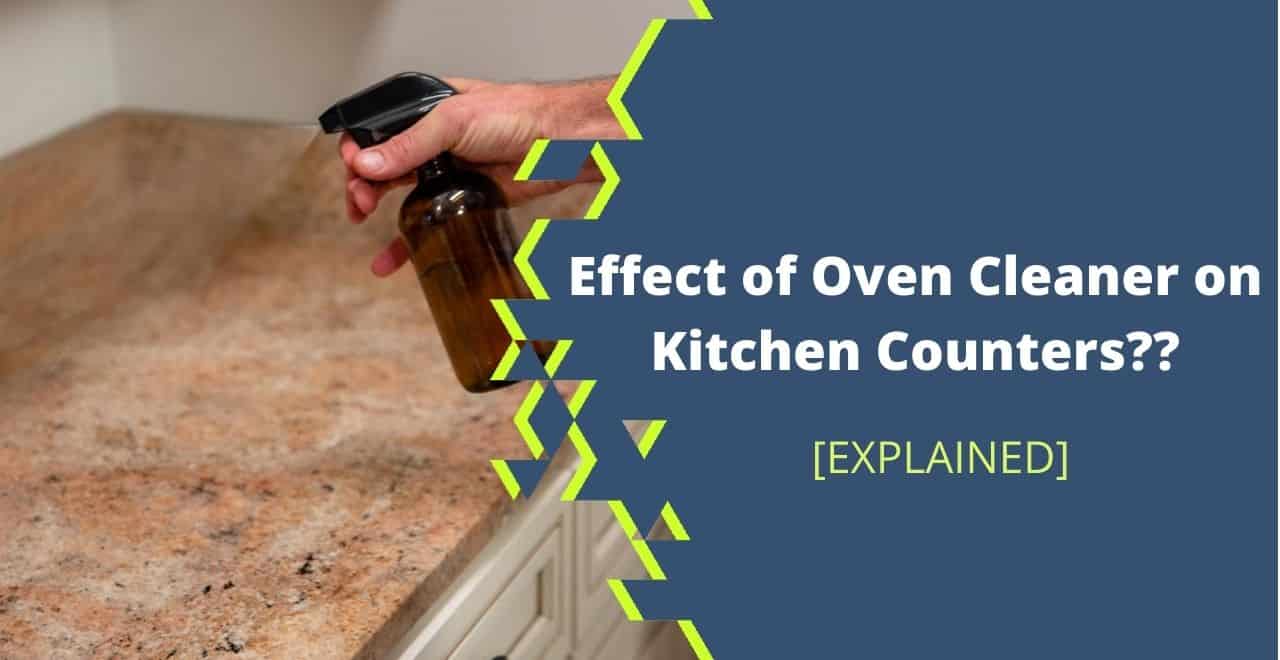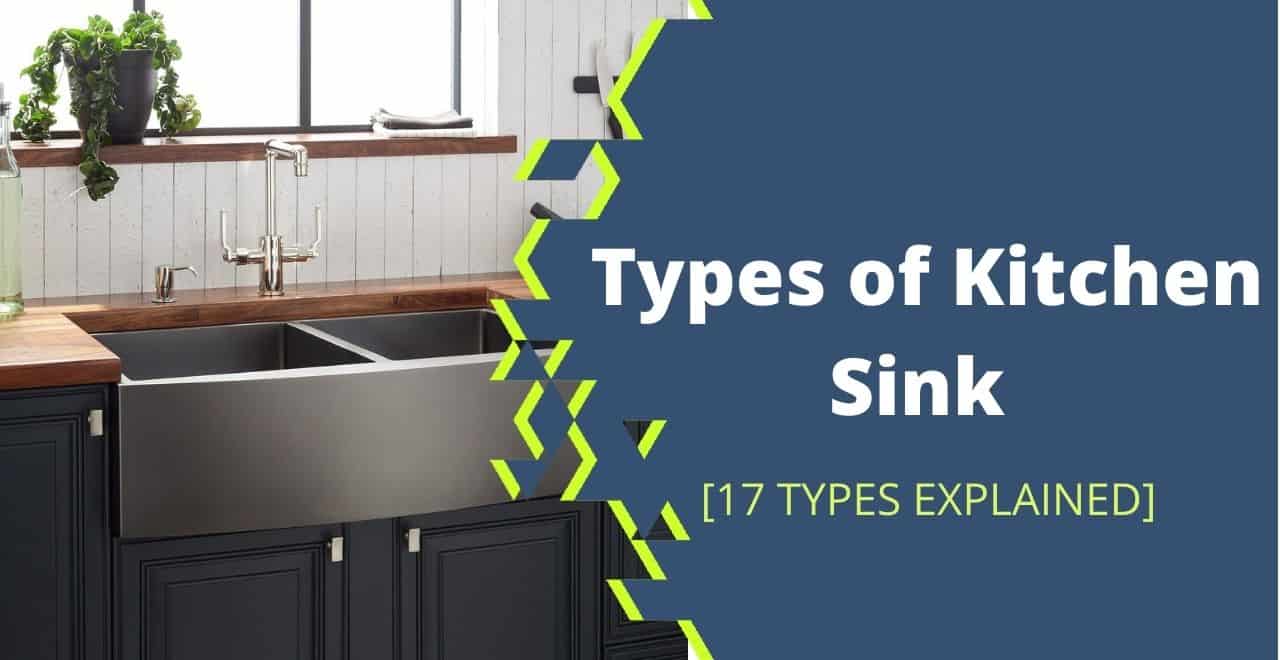You are thinking of remodeling your kitchen, and it is time to select a countertop material?
After much contemplation, you have narrowed it down to the two best countertop materials -granite and quartz. But which is better and what is different between the two?
Treehugger beautifully elaborated granite countertops popularity which says; according to NAHB’s consumer survey granite is a natural stone widely used for kitchen worktops because of its ability to resist heat and withstand everyday wear and tear.
However, at present, quartz countertop (one of the most engineered stones) is gaining popularity, due to its low maintenance, affordability, and versatility.
So, both of the material options are popular, low-maintenance, and highly durable but are they exactly similar? If not, what features make them unique and different from each other?
In this article, let us discuss the pros and cons of each material and note the differences between the granite and quartz countertops. Let us start with an overview that will help you analyze the materials before getting into the specifics.
Overview
| Granite countertops | Quartz countertops | |
| Appearance | Unique and earthy | Uniform yet appealing |
| Cost | Expensive | Slightly inexpensive |
| Durability | Highly durable provided it is sealed | Highly durable without sealing |
| Maintenance | Easy to maintain and clean | Low-maintenance than granite and easy cleaning |
| Indoor and outdoor suitability | Suitable for both -indoor and outdoor | Only suitable for indoor use |
| Heat-resistant | Yes | No |
| Scratch-resistant | Yes | Yes |
| Stain-resistant | Yes (only if sealed) | Yes |
| Difficult to install | Yes | Yes |
| Resale value | 25% approximately | Cannot be predicted but does not hamper the overall value |
| Toxicity | No | Yes (emits VOC) |
What Are Granite Countertops?
Granite, in short, is a light-colored, igneous rock with big black granules. These are purely natural stones made available directly from stone quarries. They then are cut down into thin slabs that are polished and then fabricated into kitchen countertops.
Generally, granite comprises quartz and feldspar, with mica in small quantities and other minerals.
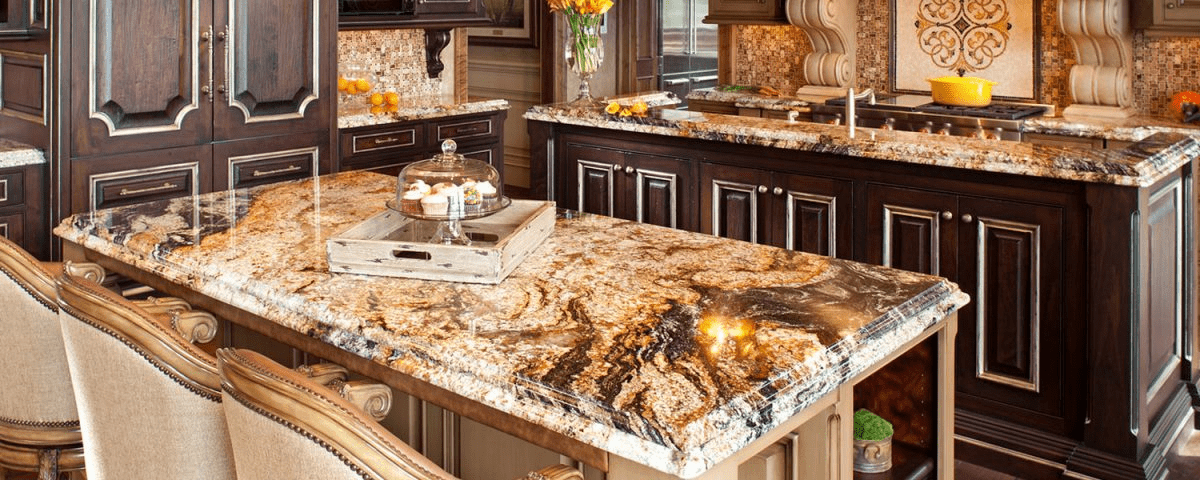
The minerals present determine the color of granite. For example, the color range may possibly vary from pitch black to white, with tints of pink, red, green, and even blue. It is obtained from the crystallization of magma that emerges from the surface of the earth.
Countertops made of granite while offering elegance and aesthetics to your kitchens and bathrooms are highly durable and reliable. Hence, granite is one of the most famous countertop materials for kitchens and bathrooms.
In the current scenario, however, granite is falling back due to the emergence of synthetic composite and quartz (engineered stone) countertops.
When choosing granite countertops for your home, keep in mind the pros and cons of the material.
Pros
Some of the pros granite countertops provide are:
Resistance to Heat
Although subjected to heat, granite countertops will not blister or melt. They can probably be regarded as the better heat-resistant materials available. For instance, if you put hot pans from the oven on a granite worktop, it won’t cause damage.
Note -The shock of the rapid shift in heat temperatures may crack or damage granite. Hence, using a trivet reduces the shock and protects the countertop.
Resistance to Scratches
While comparing the hardness and scratch resistance, granite has an advantage over other materials. Why? Because granite scores a 7 on the Mohs hardness rating scale, meaning only a few minerals can scratch granite.
Countertops of granite sustain heavy use, sharp knives, and other sharp items without scratching the surface. On the contrary, it can dull the knife blades. So, direct use of sharp objects isn’t recommended.
Easy to Clean and Low-Maintenance
Compared to other materials, granite countertops are easy to clean and are low maintenance, provided they are sealed. As granite is a porous substance, it requires sealing. Sealing protects and prevents granite from scratching and staining and makes granite easy to clean.
Although granite can withstand chemicals and cleaners, regular use of such harsh chemicals isn’t recommended.
Tip -Dark-colored granites are dense and may not even require a seal.
Uniqueness and Color Shades
Each granite is 100% natural stone and is unique because it is extracted as single, large slabs. Hence, no two granites are alike. As a result, granite worktops elevate the aesthetic appeal of a high-end kitchen and become the centerpiece of attraction by their eye-catching beauty.
In addition, granite comes in over 20 color shades that match your kitchen cabinets, flooring, and walls flawlessly.
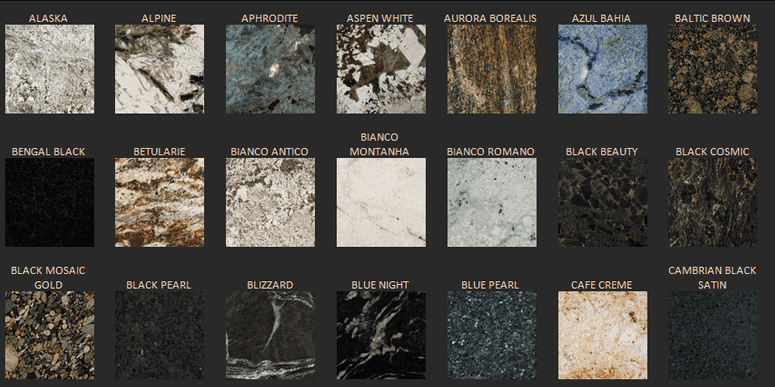
Cons
While granite performs well as countertops, they do have some potential weaknesses.
Needs Sealing
Granite is naturally absorbent. Therefore, if granite isn’t sealed or properly sealed, it may absorb oil, juice, or other liquids. These liquids will result in forming stains and may also develop bacterial growth.
Ideally, granite is resealed once per year; if you don’t, the countertops will quickly start to look stained.
Susceptible to Cracking
While it is rare because granite is durable and hard-wearing, granite countertops can chip or crack if a heavy item is dropped on the corner.
Apart from corners, the carved edges of granite and around the sink cutout are most prone to cracking or chipping. Besides, to repair damaged granite, you need to take professional help.
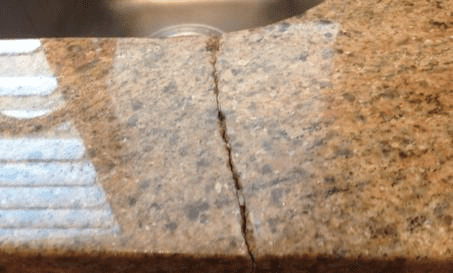
Cold
One constant complaint from natural granite countertop owners is coldness. It happens because the density of granite rapidly draws the heat away from your skin, leading the brain to interpret that the surface is cold and chilled.
Expensive
While excluding the professional installation charges, granite countertops are expensive. As opposed to laminate, or other materials, granite is on the higher end of the pay scale. Also, the thicker the slab, the more money you may expect to pay.
What Are Quartz Countertops?
These countertops are engineered quartz by combining ground stone with plastic resins. To be precise, it has around 90% of ground natural quartz and polymer resin, and hence, also known as engineered stone.
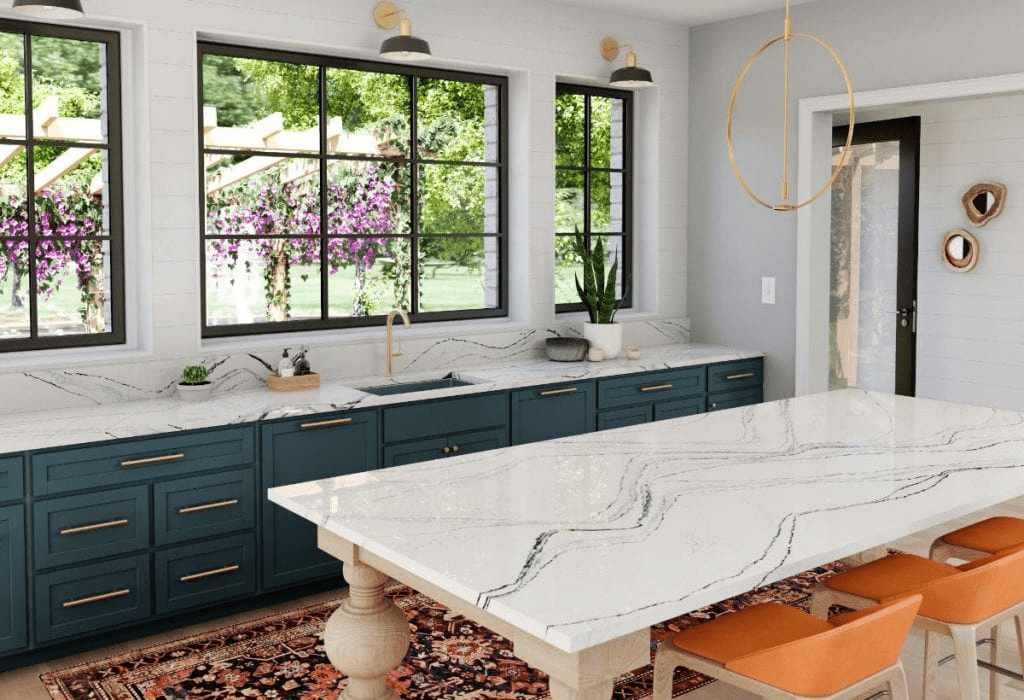
Quartz contains a considerable amount of natural quartz along with other minerals. However, we do not acquire quartz slabs from stone quarries but rather from stone products finely grounded up and turned into countertop slabs.
Countertops made of this engineered stone -quartz are preferred for their durability along with their sleek, flawless looks. It meets the stylistic standards of contemporary kitchens or bathrooms -be it rich color or exquisite patterns.
The following are the pros and cons a quartz countertop has to offer.
Pros
Durability
Unlike granite, quartz is hard and strong countertop material. As it is highly durable and has hard surface materials, quartz can sustain in a busy kitchen for years. Quartz, similar to granite, gets a 7 out of 10 on the mineral hardness scale. Apart from durability, it is also resistant to scratches, stains, and even chips.
Low-maintenance
While granite needs sealing, quartz does not require sealing because it is a waterproof and non-absorbent material. Plus, it can handle non-abrasive cleaners.
Easy to clean
As mentioned, quartz is non-absorbent, meaning it is a non-porous material. The minute pores on natural stone countertops are absent as they are packed with quartz particles. Therefore, quartz countertops are easier to clean, and the spills or stains won’t seep into the surface. Furthermore, quartz has antibacterial properties which block mold growth.
Cons
Expensive
Countertops made of quartz are considered luxurious. The cost of these countertops is typically higher than natural stone countertops. Although the material is not porous, highly durable, and stunning, it does come at a cost.
Resistance to heat
Quartz is resistant to heat; polymer resins and fillers are not. When quartz countertops are exposed to hot kitchenware, the resins can melt, resulting in lasting staining and damage. Although quartz is said to withstand heat temperatures up to 300 degrees F, resins binding the quartz may damage.
Difficult installation
Another weakness is that due to the heavy weight, quartz worktops are not DIY installation. Generally, the material, per square foot, weighs around 20-25 pounds. Hence, it requires professional help to measure and install the countertop successfully.
6 Key Differences and Similarities Between Granite and Quartz Countertops
While we learned the pros and cons of granite and quartz countertops individually, let us compare and contrast the two and explore the key differences between them. It will help you get clarity in choosing a material for your kitchen.
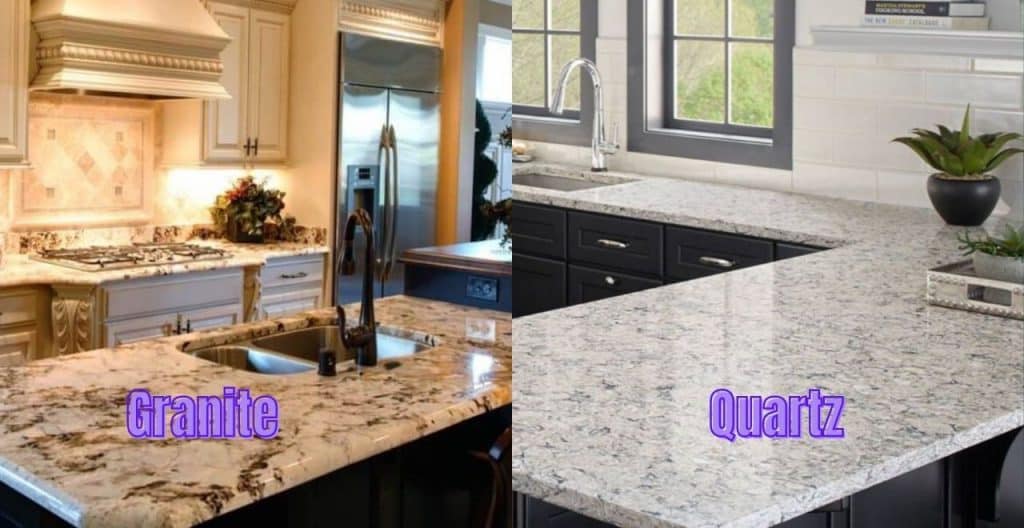
Cost
Concerning the cost, both of them are luxurious and premium materials. Both granite and quartz are expensive and definitely not a budget-friendly option.
On average, granite countertops per square foot cost $40 to $60. On the other hand, quartz countertops are slightly cheaper than granite. For a square foot, quartz, with not much difference, costs you $55.
Summary -If you’re on a budget, both the materials are not cut out for you because both of them are expensive.
Appearance
Granite(a natural stone) has a slight advantage over quartz (an engineered stone) in terms of appearance because each granite slab has a different pattern and color. It makes granite unique.
On the contrary, quartz countertops come in many color shades but offer a uniform appearance.
Summary -Appearance is subjective. So, it boils down to what your preferences are and what might add beauty to your home. But, granite is at an advantage here.
Durability and Maintenance
Though both are highly durable materials, quartz countertops are more durable than granite. As a relatively porous stone, granite must be sealed after installation and regularly once a year. Furthermore, granite slabs may be prone to cracking due to inherent flaws.
In contrast, quartz slabs do not need sealing because the resins used in their construction keep them uniform, which means they rarely crack.
Summary -In terms of maintenance, quartz wins over granite.
Resale Value
Countertops made of granite may assist in selling a home faster but won’t guarantee an increase in value. Granite contributes just about a quarter (25%) of its cost to the overall resale value.
For quartz, in particular, it cannot be predicted, but it does not in any way harm the resale value of your home but it can increase the value if you do certain things.
Summary -Be it granite or quartz, the key is to how clean and well-maintained is your countertop. However, both granite and quatz do not necessarily harm the resale value.
Outdoor Suitability
A growing trend of outdoor kitchens and bars increases the demand for the perfect countertop material. In terms of suitability, quartz countertops, unfortunately, are suitable indoors and not outdoors. It is because, in direct sunlight, the resins that connect the countertops can discolor or fade. However, this can happen even if you are inside, near a sunny window.
On the other hand, granite is suitable for indoor and outdoor use.
Note -Even if granite is suitable for outdoor use, the direct UV rays might discolor granite just like quartz.
Summary -Granite is a more suitable countertop material for outdoor use than quartz.
Toxicity
Another difference that exists between granite and quartz countertops is the toxicity or, to be precise, emission of Volatile Organic Compounds (VOC). Unlike granite, the composition of quartz (engineered stone) has approximately 7-15% of resin content. The higher the resin content, the higher the emission of VOC.
The emission is hazardous to health. Plus, it has a negative impact on the environment. Hence, granite countertops are preferable to quartz because they do not have resin content and are not toxic.
Summary -In terms of toxicity and environmental impact, choose granite countertops over quartz.
Conclusion
Granite and quartz (engineered stone) are durable yet expensive countertop materials that increase a home’s resale value. Granite appeals to those who prefer natural materials, although quartz is easier to maintain and has a minor edge in terms of durability.
Finally, it comes down to what you like, what suits your kitchen, what your budget is, and all such kinds of questions. So, choosing really boils down to your preferences and priorities.
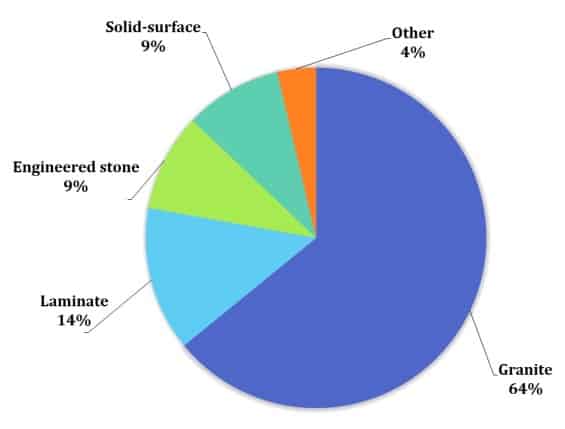
![Granite Vs. Marble Vs. Quartz Countertops [12 Differences+Pros & Cons] Granite Vs. Marble Vs. Quartz Countertops [12 Differences+Pros & Cons]](https://houseadorable.com/wp-content/uploads/2022/03/quartz-marble.jpg)
![Granite vs. Laminate Countertop [Pros and Cons+10 Key Differences] Granite vs. Laminate Countertop [Pros and Cons+10 Key Differences]](https://houseadorable.com/wp-content/uploads/2022/03/Granite-vs.-Laminate.jpg)
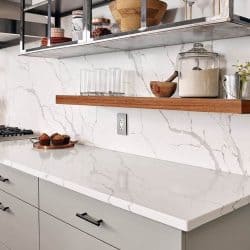
![What Are Kitchen Sinks Made Of ? [13 Types+Pros & Cons] What Are Kitchen Sinks Made Of ? [13 Types+Pros & Cons]](https://houseadorable.com/wp-content/uploads/2022/01/Sink-MAterial.jpg)
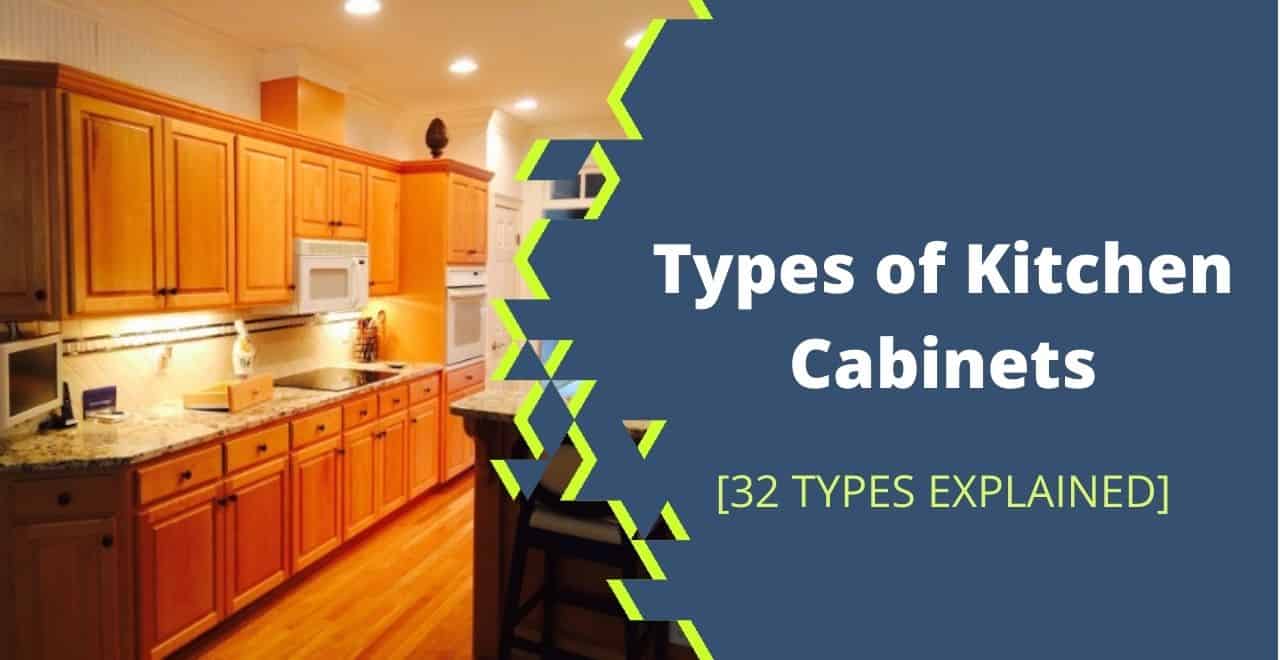
![Ceramic vs Stainless Steel Sink [A Detailed Analysis] Ceramic vs Stainless Steel Sink [A Detailed Analysis]](https://houseadorable.com/wp-content/uploads/2021/12/Ceramic-vs-ss.jpg)
